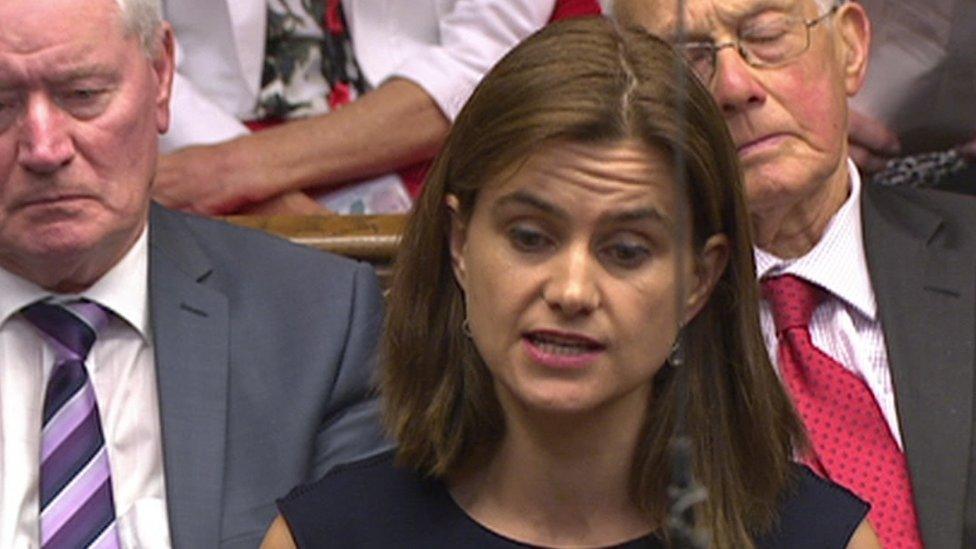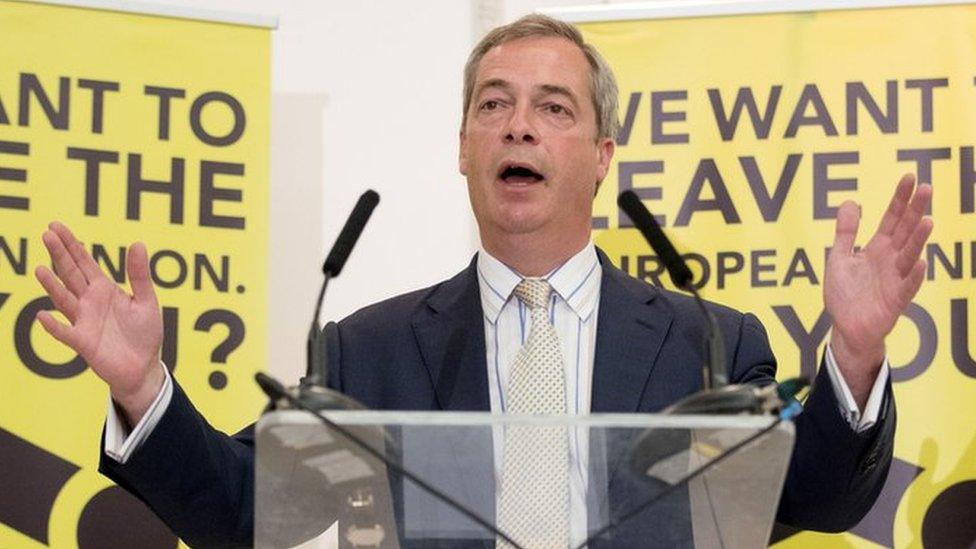EU referendum: Farage and Welby in 'racism' row
- Published
Archbishop Justin Welby: "That is accentuating fear for political gain"
Nigel Farage has hit back at claims by the Archbishop of Canterbury that he is "legitimising racism" in a row about comments over migrant attacks on women.
The UKIP leader appeared to suggest staying in the EU made the risk of assaults like those in Cologne on New Year's Eve more likely in the future.
Justin Welby told MPs that the remarks were an "inexcusable pandering to people's worries and prejudices".
But Mr Farage suggested that Mr Welby had not actually read what he said.
Pressed on his comments in a special EU referendum debate on ITV, he said he was not going to attack the Archbishop but suggested Remain campaigners were "coming for him" and trying to "conflate" his views about immigration controls and what happened in Germany.
Mr Farage insisted he had chosen his words about the subject carefully but Britain Stronger in Europe said he had "gone too far.... by blaming immigrants for all and any problems in our country".
Allegations that hundreds of women were groped, robbed and intimidated at Cologne's central station on New Year's Eve emerged in January.
Victims described chaos outside the city's main station, as the men - some of whom were identified in an official report as migrants or asylum seekers of North African and Arab origin - carried out dozens of attacks with little apparent response from the authorities.
In an interview with the Sunday Telegraph, external, Mr Farage was asked whether there was an increased risk of attacks on women by migrants - of the kind alleged to have taken place in the German city - happening in the UK if it voted to remain in the EU.
He said it would depend on whether the UK "voted for Brexit or not" and whether migrants were given EU passports.
'Cultural differences'
Describing the issue as a "nuclear bomb", he suggested that women may be at a particular risk from the "cultural" differences between British society and migrants.
The Archbishop told MPs on the Home Affairs Select Committee that he condemned the remarks "without hesitation".
Nigel Farage: "I've said nothing out of line at all"
"That's giving legitimisation to racism… we can't legitimise that," he said. "Fear is a pastoral issue - deal with it by recognising it, standing alongside and providing answers to it. What that is is accentuating fear for political gain and that is absolutely inexcusable."
After Labour MP Keith Vaz said he regarded the comments as racist, Mr Welby replied "I would agree with you."
But Mr Farage said the Archbishop had simply read the newspaper headlines and not what he had actually said.
"Nothing I have said is racist," he said. "I have said nothing worse than many other politicians and commentators. I have always used very conservative language.... I said there is a cultural question. Nothing more."
'Not full up'
Mr Farage, who will face questions from a live studio audience in the latest set piece TV event of the referendum campaign, said he had never claimed immigration would lead to sex attacks.
But he repeated his concerns that there was an issue with refugees recently arrived in Germany and Sweden eventually getting passports from those countries and being able to travel freely to the UK.
During his appearance before MPs, the Archbishop insisted he was not supporting either side in the referendum campaign but elaborated on his views about what was the right level of immigration for the UK.
"If I'm honest, no, I don't think Britain is full," he said. "We can take more people in, but we have to think very, very hard about doing it," he said, adding that although he had no upper limit in mind "I don't think we are there yet".
But he said he accepted that immigration was a "burden" on communities and the government needed to provide them with the resources to cope with rising population levels and the pressures this brings on services.
"It's a national issue not a local issue - not only for the direct cost of those who are coming in as immigrants but to strengthen the stability and infrastructure around particularly education, health and housing of those communities that are accepting people.
"That actually, in my experience, liberates the natural generosity of people to welcome, once the causes or the reasons for fear have been dispelled - and they are quite easily dispelled."
- Published5 June 2016

- Published5 June 2016
